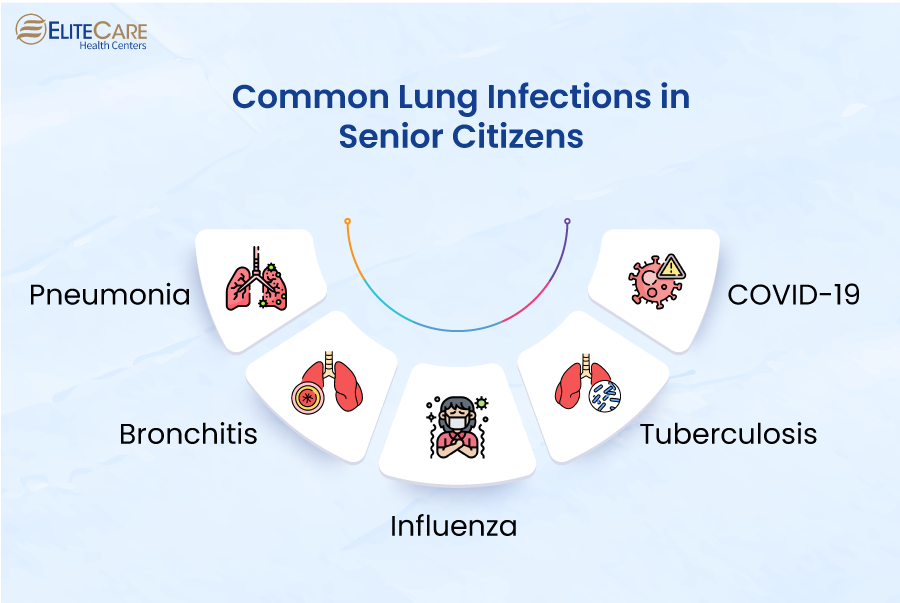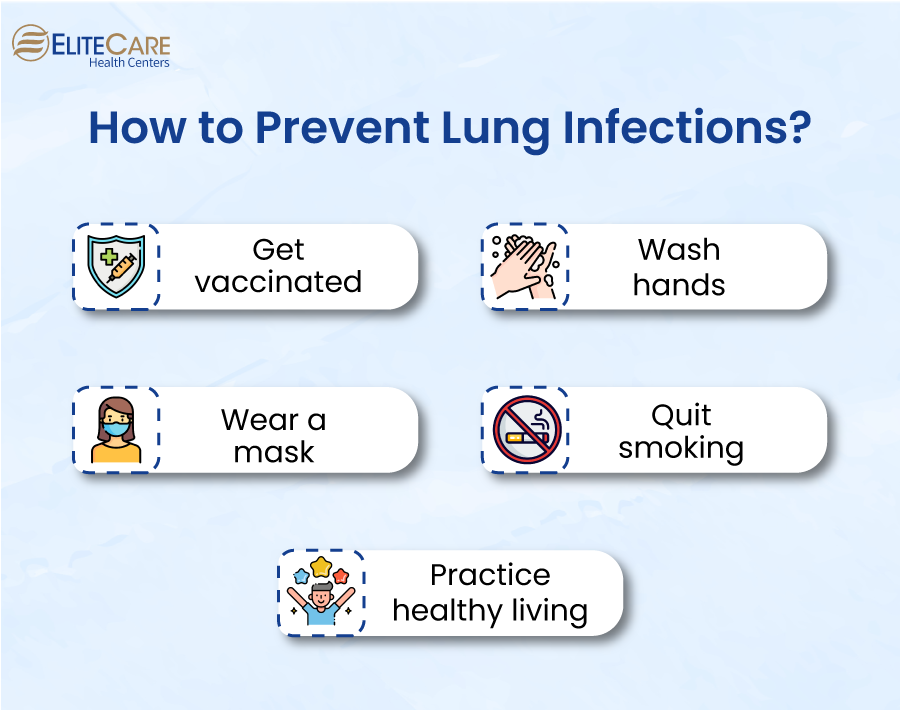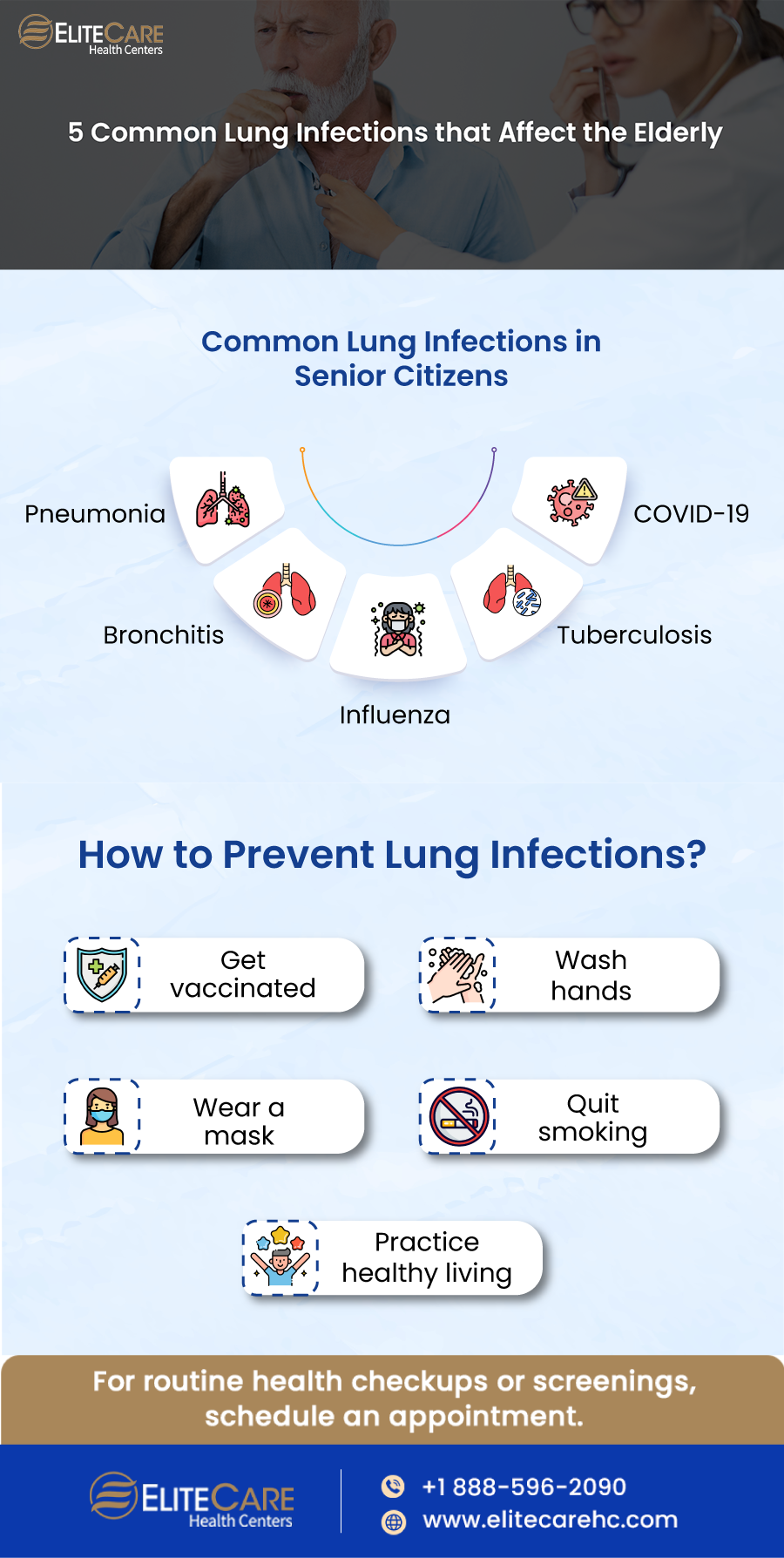
A lung infection occurs when harmful microorganisms such as bacteria, viruses, fungi, or other pathogens invade and infect the lung tissue. The infection can occur in any part of the lung, including the bronchi, alveoli, and other structures that make up the respiratory system. Lung infections can range from mild to severe and can affect individuals of any age, although certain infections may be more prevalent in specific age groups.
Respiratory tract infections are one of the leading causes of death resulting from infectious diseases in seniors. In the United States, 20% of seniors suffering from severe pneumonia succumb to the condition despite receiving treatment. Moreover, the mortality rate for seniors suffering from influenza is as high as 83% and over 90% of COVID-related deaths occur in older adults.
Age-related changes in the immune system, chronic health conditions such as diabetes, heart disease, chronic obstructive pulmonary disease (COPD), and weakened respiratory muscles can make seniors susceptible to developing lung infections. Additionally, lifestyle factors such as smoking or long-term exposure to air pollution can contribute to lung damage and increase the risk of lung infections.
Signs of Lung Infection
In seniors, symptoms of a lung infection may vary depending on age, overall health, and the type of pathogen responsible for the infection, such as a virus, bacteria, or fungus. Some of the most common signs of lung infection include:
- Cough
- Wheezing
- Fever
- Chills
- Fatigue
- Confusion
If an elderly loved one is experiencing any of these symptoms, it is important to seek medical attention promptly as lung infections can cause life-threatening complications in seniors.
Common Lung Infections in Senior Citizens

Senior citizens are susceptible to various kinds of lung infections and they can be grouped based on how they affect the lungs and airways. The most common ones include:
Pneumonia
It occurs when poor immune system response allows disease-causing microorganisms to enter the lungs. To combat these invading organisms, white blood cells accumulate rapidly in the affected area. This accumulation, along with the presence of bacteria and fungi, can cause the air sacs in the lungs to become inflamed and filled with fluid.
Pneumonia has an atypical presentation in the elderly. Therefore, respiratory symptoms may be absent altogether in some cases. This in turn can delay diagnosis and increase the risk of mortality in the elderly.
Bronchitis
It is a condition in which the bronchial tubes that carry air to the lungs become inflamed and produce mucus excessively. Excessive mucus paired with swelling and inflammation can obstruct the airways, making it difficult to breathe.
In seniors, bronchitis is often caused by viral infections, such as the common cold or flu. Exposure to irritants such as smoke, air pollution, or chemicals can also trigger this condition. Seniors with chronic obstructive pulmonary disease (COPD) are particularly susceptible to bronchitis.
Influenza
It is a viral infection that causes inflammation and irritation in the respiratory tract, which includes the nose, throat, bronchi, and lungs. The protein in the flu virus that helps it to multiply rapidly also tends to damage the epithelial cells of the lungs, leading to fluid accumulation. In severe cases, fluid accumulation in the lungs can make it difficult to breathe and can limit the flow of oxygen into the bloodstream.
Seniors suffering from influenza are susceptible to various complications like pneumonia and bronchitis. It could also further worsen underlying medical conditions and increase hospitalization and mortality rate in seniors.
Tuberculosis
TB is a potentially serious infectious disease caused by Mycobacterium tuberculosis. During active TB, the bacteria multiply and attack various parts of the body, including the lungs, lymph nodes, bones, kidneys, brain, spine, and skin. After infecting the lungs, the TB bacteria spread to other parts of the body through the bloodstream or lymphatic system.
Read More: 4 Ways to Maintain Kidney Health in the Elderly
In seniors, a proper diagnosis of tuberculosis can often be challenging because they present nonspecific symptoms that are similar to those of other illnesses. This can cause a delay in diagnosis resulting in life-threatening complications.
COVID-19
It’s a contagious respiratory illness caused by the novel coronavirus SARS-CoV-2. When the virus enters the body, it attaches to cells in the respiratory tract, particularly the lungs. The virus then takes control of the cell’s machinery to replicate and spreads throughout the respiratory system. As the virus replicates, the immune system releases a protein called cytokine which causes inflammation in the air sacs of the lungs. This can cause conditions like pneumonia or acute respiratory distress syndrome (ARDS).
Weakened immune systems and underlying health conditions such as heart disease, lung disease, and diabetes can increase seniors’ risk of developing COVID-19. They are also more likely to experience severe complications from the disease.
Additionally, seniors are also more likely to suffer from a lung infection caused by aspiration pneumonia, which occurs when food, saliva, stomach acid, or other fluids are breathed into the lungs instead of being swallowed into the digestive system. This can lead to inflammation and infection in the lungs. Seniors suffering from Parkinson’s disease, dementia or stroke are particularly at high risk of developing this condition.
As senior citizens are at an increased risk of mortality due to the severe complications that arise from lung infections, they must take certain steps to strengthen their bodies against these infections.
How to Prevent Lung Infections in Seniors?

Seniors can take various steps to prevent lung infections. Here are a few:
1. Get Vaccinated
Seniors must get immunizations to strengthen their immune systems against common lung infections like pneumonia, tuberculosis, influenza and COVID. It’s important to consult a doctor and get annual physical exams to stay up to date with these immune boosting shots.
2. Wash hands
Regularly washing hands with anti-bacterial soap and water or using a hand sanitizer can help prevent the spread of respiratory viruses and bacteria.
3. Wear a mask
N95 masks can reduce exposure to respiratory viruses and bacteria that spread through droplets when an infected person talks, coughs, or sneezes.
4. Quit smoking
Smoking can damage the lungs and suppress the immune system. Therefore, seniors who don’t smoke are better equipped to fight off respiratory infections.
5. Change lifestyle habits
Regular exercise, adequate nutrition and rest can boost the immune system and help it fight against common respiratory infections that affect the elderly.
Seniors suffering from chronic conditions such as COPD or heart disease must work with their healthcare provider to manage these conditions better. This is important because untreated underlying health conditions can significantly increase the risk of developing complications from common respiratory infections like cold or flu.
Takeaway
- Age-related changes in the immune system and underlying health conditions can increase seniors’ risk of developing lung infections, which can pose life-threatening complications in the elderly.
- However, seniors can significantly improve their chances of overcoming common respiratory infections by getting vaccinations in a timely manner and adopting healthy hygiene practices.
If your elderly loved one is in need of an immunization shot for flu or other respiratory infections, visit the nearest EliteCare Health Centers clinic for more help. EliteCare is one of Florida’s best medical clinics, with a team of highly trained primary care physicians who offer services like venipuncture, immunizations, EKG and more. Visit their website to schedule an appointment today.






